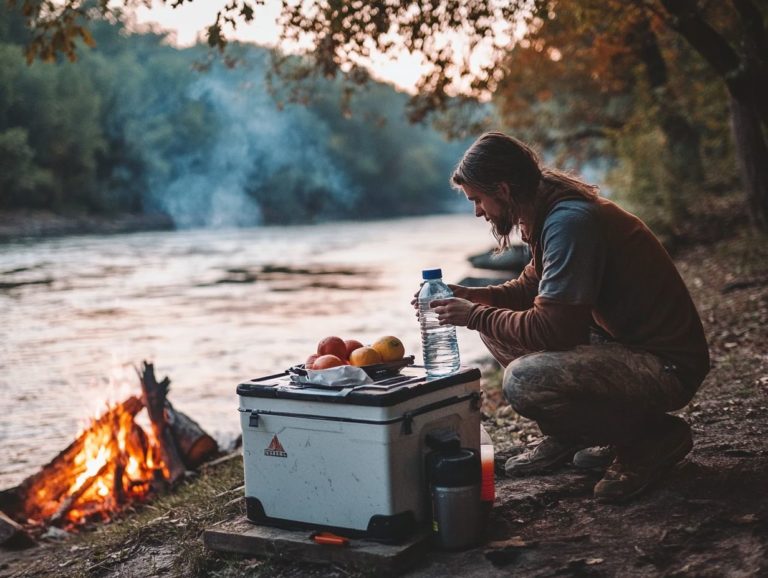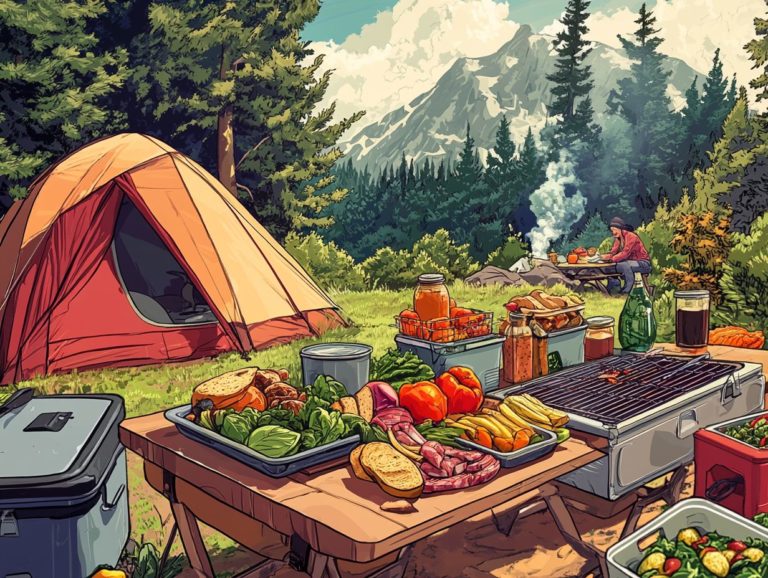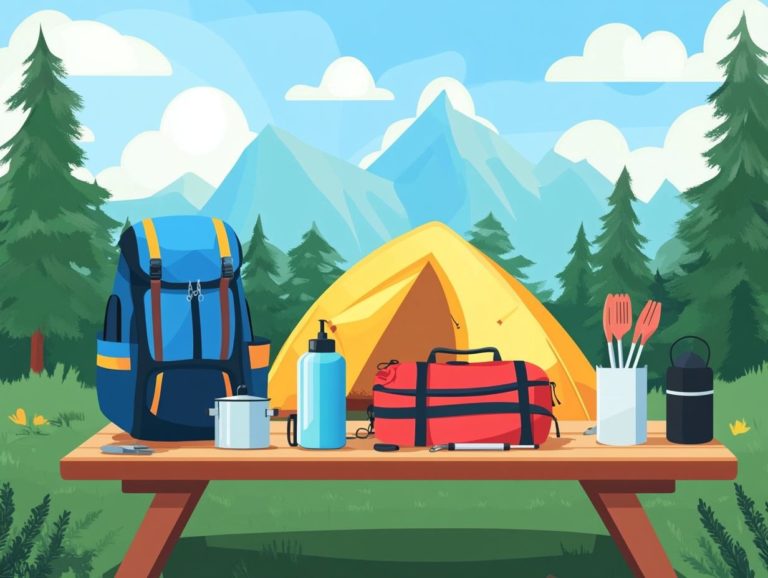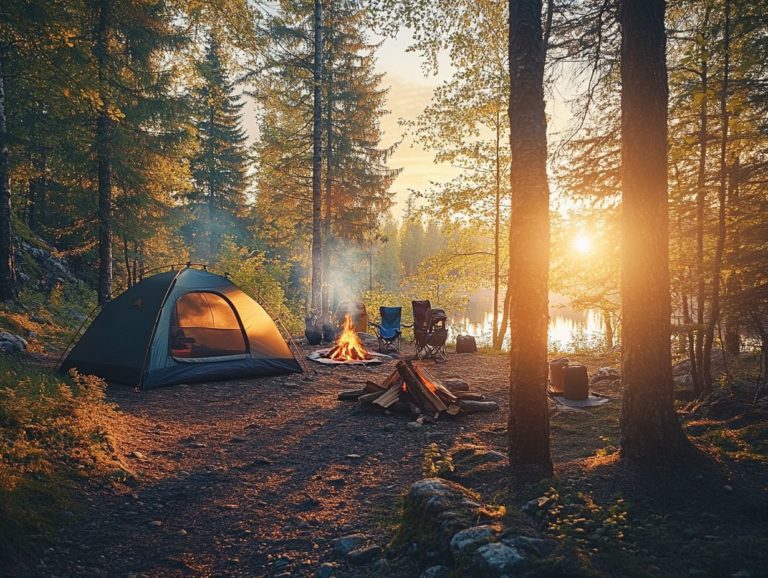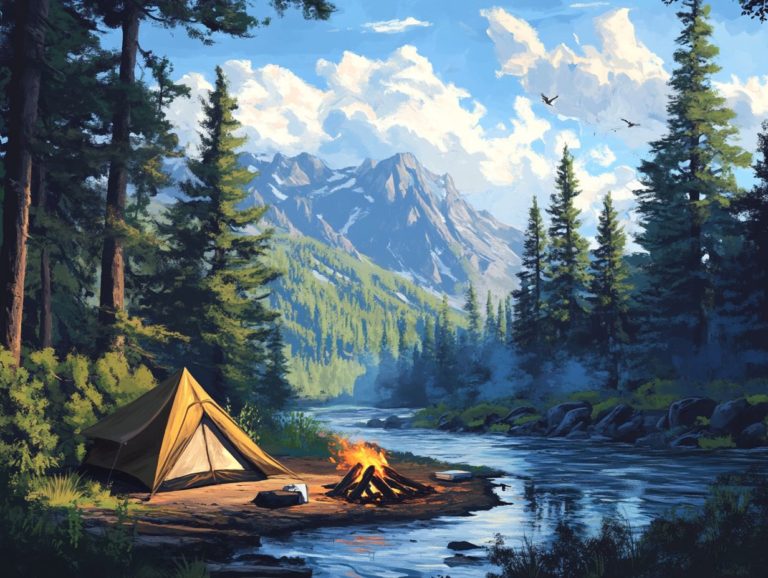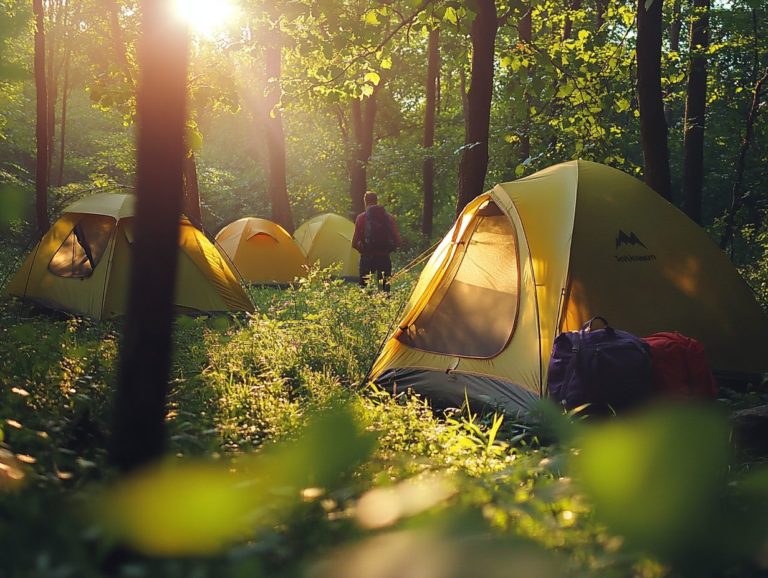Camping in National Parks: What to Bring
Planning a camping trip in a national park can be an exhilarating adventure. Packing the right gear is essential for a successful experience.
Choosing the perfect tent and sleeping bag matters. This guide highlights essential items, including clothing for unpredictable weather and crucial navigational tools.
You will also find tips on efficient packing to maximize space and comfort while maintaining safety. Get ready for an exciting outdoor adventure!
Contents
- Key Takeaways:
- Essential Gear for Camping in National Parks
- Recommended Clothing for National Park Camping
- Must-Have Extras
- Tips for Packing Efficiently
- Frequently Asked Questions
- What should I bring when camping in a national park?
- Do I need to bring my own food when camping in a national park?
- What type of clothing should I bring when camping in a national park?
- Is it necessary to bring a first aid kit?
- Can I bring my own camping gear or do I have to rent it?
- Are there any items I should not bring when camping in a national park?
Key Takeaways:
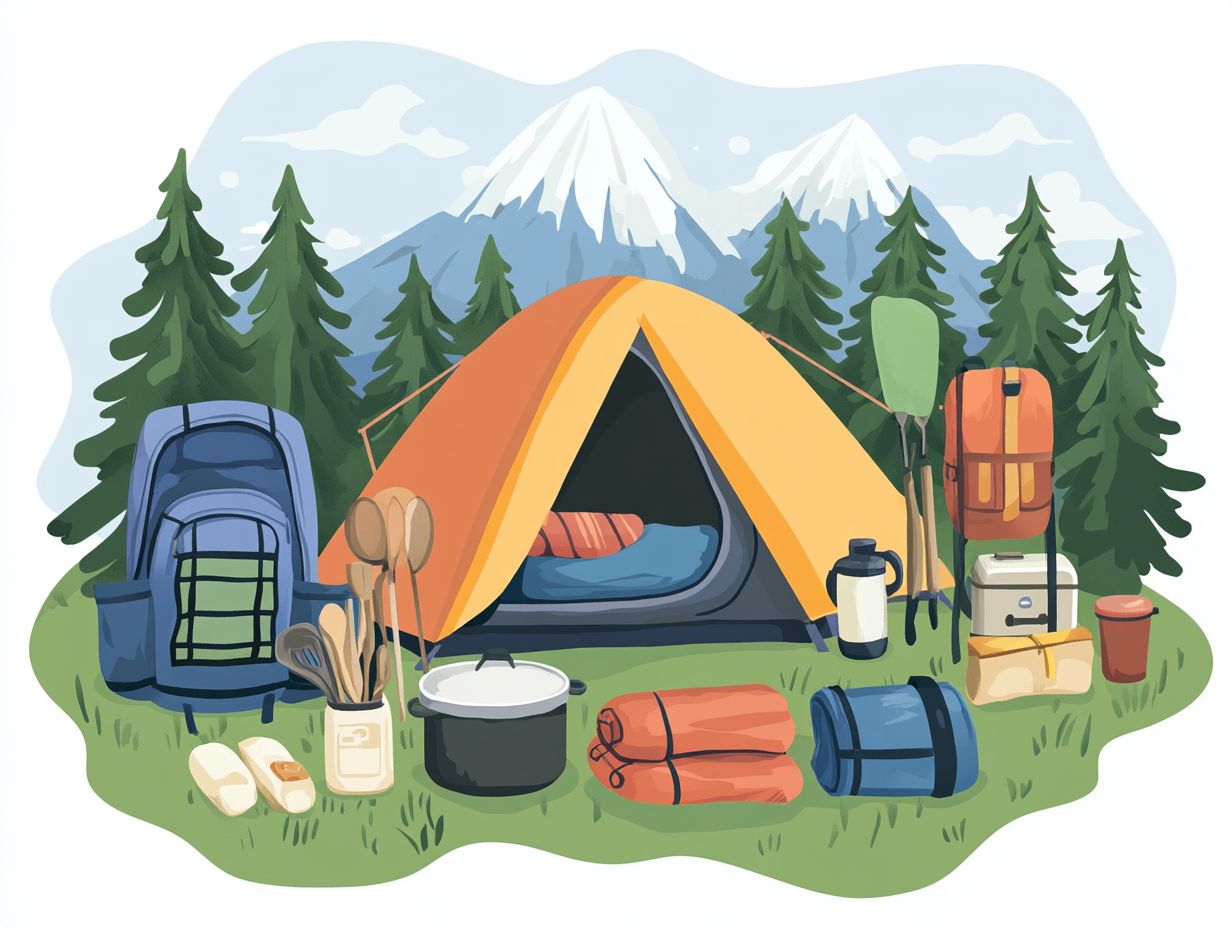
- Bring shelter gear, including tents and sleeping bags for a comfortable experience.
- Pack clothing for varying weather, and consider layering for versatility.
- Don’t forget navigational tools, emergency supplies, and entertainment. Pack efficiently!
Essential Gear for Camping in National Parks
When planning a camping trip in America the Beautiful, having the right gear is crucial. This ensures a safe and enjoyable experience.
Choose a durable tent that can withstand wind and rain. Also, bring a sleep pad that automatically inflates for comfort.
You should include essentials like an insulated water bottle and a bear-proof cooler. These items will keep you hydrated and energized during your adventure.
Tents, Sleeping Bags, and Other Shelter Needs
Selecting the right tent is key for your camping adventure. The weather in national parks can change unexpectedly.
Consider a quality tent that meets your specific needs. A cozy two-person tent is great for solo trips, while larger models suit group outings.
Pair your tent with a high-quality sleeping bag for a restful night. A self-inflating sleep pad provides essential insulation from the cold ground.
Innovative camping pillows can enhance your comfort. Brands like Big Agnes and Nemo offer products that combine practicality and comfort.
Cooking and Food Preparation Gear
Cooking while camping can turn simple meals into culinary delights. A reliable camp stove is essential for efficient cooking.
Use portable cooking options, such as lightweight grills, to create delicious dishes. Don’t underestimate the importance of a cooler or bear-proof storage.
Prep gourmet meals ahead of time to impress your fellow campers. Marinate proteins and chop vegetables in advance for an effortless dinner under the stars.
Hygiene and Personal Care Items
Maintaining hygiene while camping is crucial for both comfort and health, particularly in the great outdoors where resources can be scarce. To ensure a safe and enjoyable experience while camping with kids or pets, it’s essential to pack the right hygiene and personal care items.
- Camping soap isn’t just a multipurpose cleaner for your hands and dishes; it’s also a vital tool for keeping those pesky germs at bay.
- Sunscreen is a must-have to protect sensitive skin from harmful UV rays, making it non-negotiable for camping with kids.
- Bug spray is essential for fending off annoying insects that can turn your outdoor adventure into a scratching fest.
Collectively, these items, along with other essential accessories for exploring national parks, make camping even better, allowing you and your companions to focus on creating wonderful memories in nature.
Recommended Clothing for National Park Camping
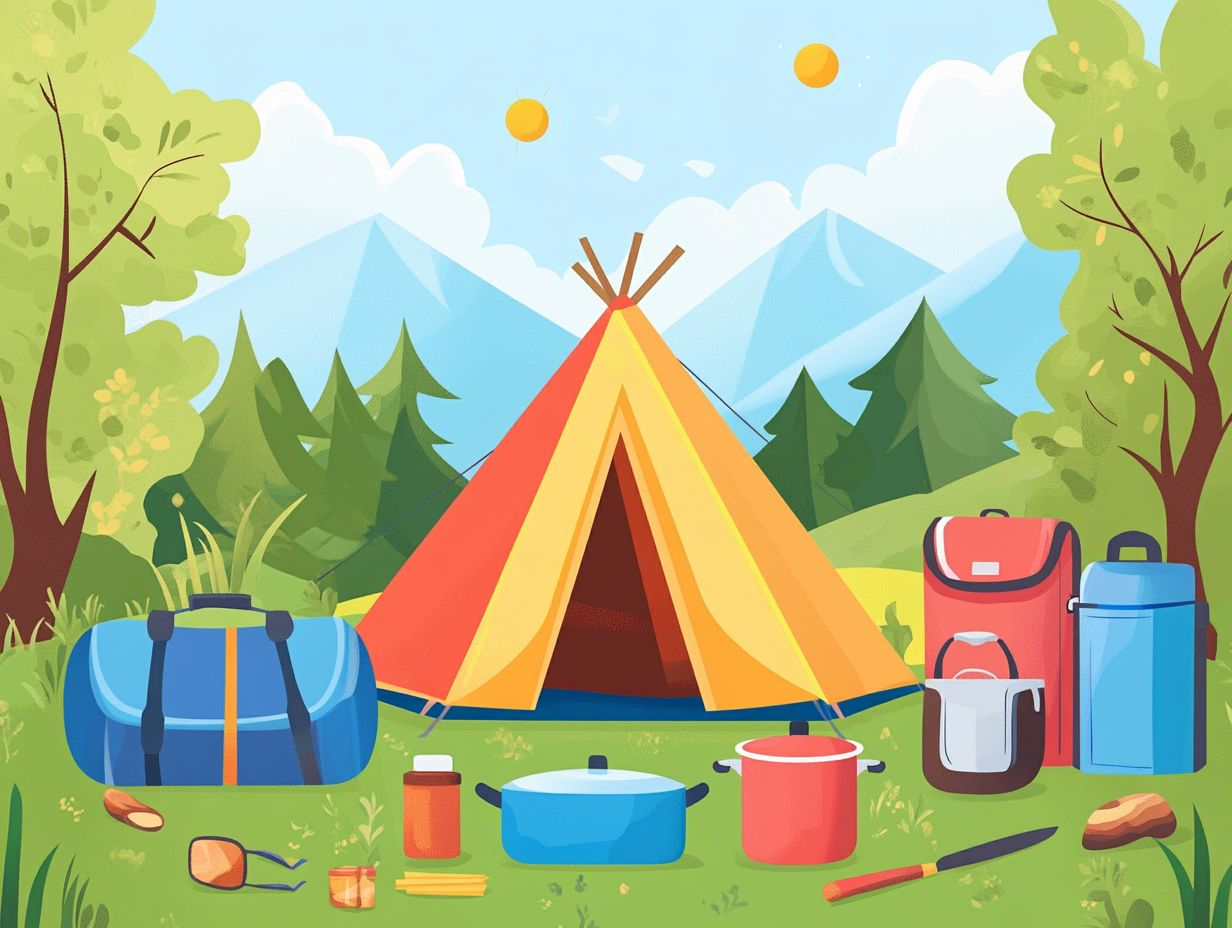
When you embark on a family vacation to national parks, especially during summer road trips, choosing the right clothing is essential for enjoying outdoor activities and ensuring your comfort throughout the camping experience.
Appropriate Layers for Varying Weather
Dressing in the right layers is crucial when camping, as temperatures can swing dramatically in mountainous areas. Knowing how to layer your clothing can make the difference between feeling cozy and downright miserable outdoors. You never know when the weather might turn, with chilly mornings giving way to warm afternoons and unexpected rain showers.
Here are key items to keep in mind:
- Fleece jackets offer warmth and can be effortlessly added or removed as conditions change.
- A reliable rain jacket provides waterproof protection without compromising breathability.
Outdoor enthusiasts frequently recommend brands like Patagonia and The North Face for their commitment to quality and innovation in outdoor apparel. Start with moisture-wicking base layers, then layer on insulating mid-layers like fleece. Finish with a weather-resistant outer layer to stay comfortable and protected throughout your adventure.
Step Up Your Footwear Game
Choosing the right footwear makes your adventure safer, especially when navigating the rugged terrains of national parks. A sturdy pair of hiking boots will offer the support and protection you need, enhancing your stability and minimizing the risk of injuries.
Consider factors such as material, grip, and waterproofing to ensure optimal performance in all your outdoor activities. This holds true whether you re enjoying a casual day hike or tackling a more intensive backpacking trip.
Beyond just footwear, don t overlook the importance of packing essential accessories.
- Portable chargers can keep your communication devices powered.
- Travel pillows can make a world of difference in your rest during overnight excursions.
When selecting your boots, prioritize fit and comfort, along with the type of terrain and length of your hike. This preparation ensures you re ready for every outdoor challenge, including diverse camp activities.
Must-Have Extras
Packing the right additional items, like a portable hammock or multitool, can elevate your camping experience, ensuring you re well-prepared for both your planned activities and any unexpected situations that may arise in the great outdoors.
Start planning your camping trip today, and pack your bags for an unforgettable adventure!
Reliable navigational tools and emergency supplies are lifesavers while camping. Items like GPS devices and compasses are essential.
GPS (Global Positioning System) devices guide you through complex terrains, ensuring you stay on track in unfamiliar landscapes. Compasses serve as dependable backups, especially when technology plays tricks on you.
First aid kits are equally important. They tackle unexpected injuries, providing you peace of mind during minor mishaps. Multitools also come in handy, offering versatile solutions for challenges like quick repairs or meal preparation.
Together, these resources establish a critical foundation for a memorable and secure camping experience.
Entertainment and Comfort Items
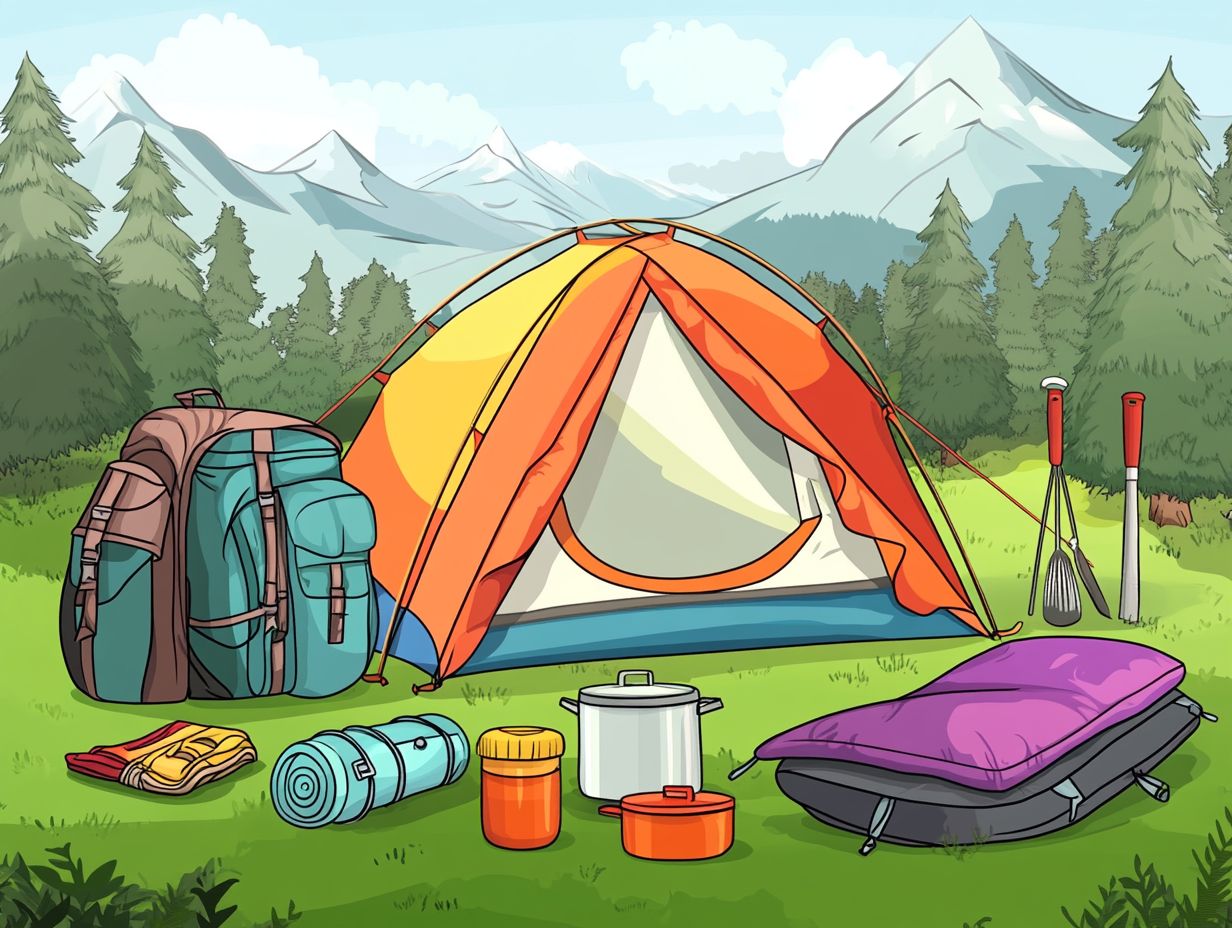
Bringing along entertainment and comfort items can truly elevate your camping experience. This is especially true when adventuring with kids who may need a little extra engagement.
Incorporating a variety of entertainment options, like board games or books, keeps young adventurers entertained amidst nature’s stunning backdrop. Before you head out, pack a selection of books that cater to different age groups, ensuring there s something for every reader.
Board games or card games are perfect for cozy evenings around the campfire, promoting teamwork and laughter. Don’t forget the thrill of game nights or the coziness of a portable hammock!
Setting up a schedule of activities, such as nature scavenger hunts or storytelling sessions, helps keep spirits high and creates unforgettable memories while you soak in the tranquility of the great outdoors.
Tips for Packing Efficiently
Efficient packing is vital for camping. Make sure you have all your essentials, like a camp stove and self-inflating sleep pad.
Maximizing Space and Weight Limits
To make the most of your space and stay within weight limits, it s crucial to select a spacious backpack and pack strategically. Ensure you have items like a bear-proof cooler for your gourmet meals.
Using compression bags can greatly enhance available space, allowing you to bring along more items while keeping everything neatly organized. Sort your gear by category think clothing, cooking supplies, and personal items so your essentials are always at your fingertips during your outdoor adventures.
When choosing the perfect backpack, consider size, comfort, and weight distribution to ensure it suits your body perfectly. Keeping your pack’s weight within recommended limits is vital for your comfort and safety on the trail, ultimately enhancing your overall experience in nature.
Frequently Asked Questions
What should I bring when camping in a national park?
When camping in a national park, bring a tent, sleeping bag, camping stove, food, water, and appropriate clothing for the weather. Also, consider including a first aid kit, bug spray, and a park map.
Do I need to bring my own food when camping in a national park?
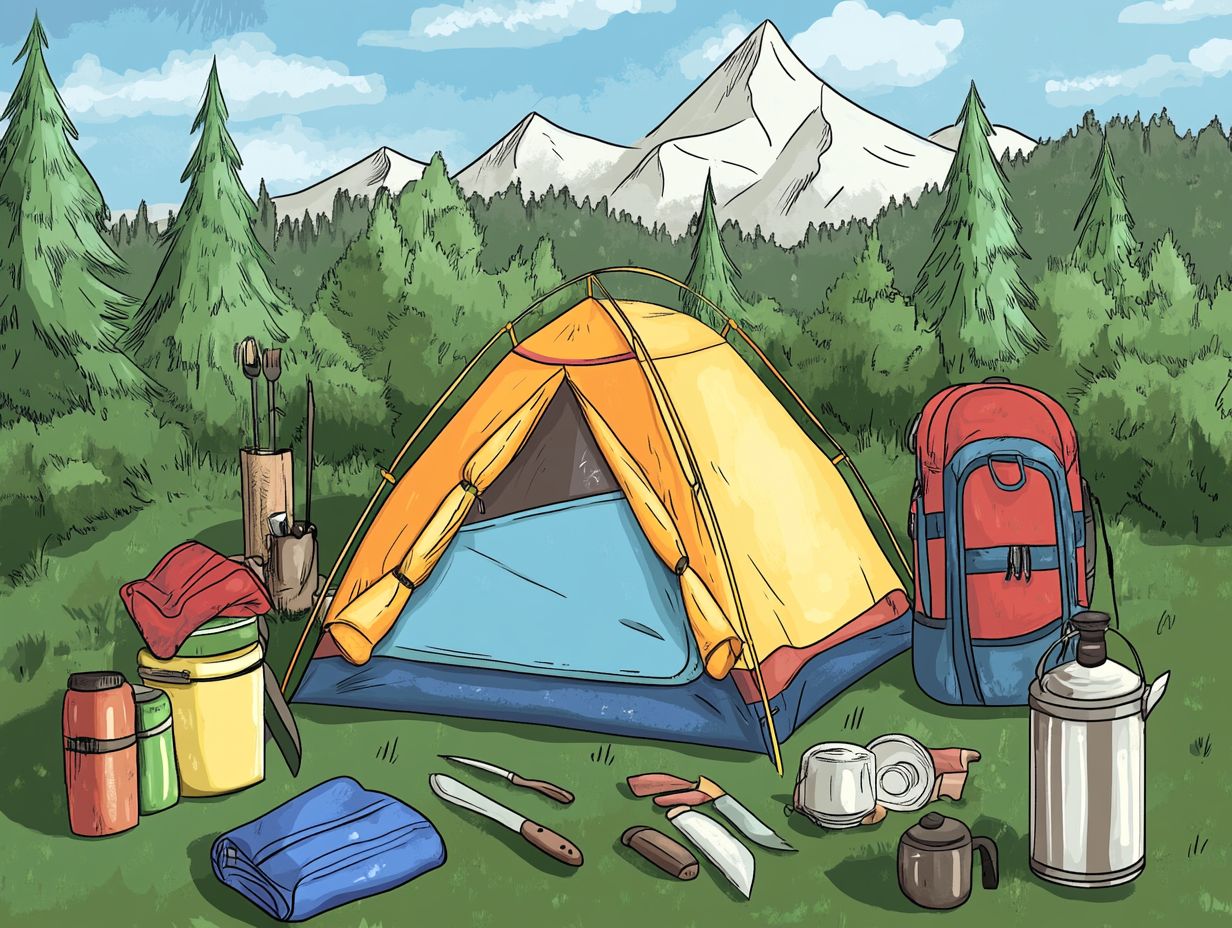
Yes, bring your own food when camping, as options may be limited. Pack non-perishable items like canned goods, granola bars, and dried fruits to ensure you have enough to eat during your trip.
What type of clothing should I bring when camping in a national park?
Your clothing choice should fit the weather and activities planned. Bring layers like a warm jacket and rain gear, as conditions can change rapidly.
Sturdy shoes or hiking boots are essential for protecting your feet.
Is it necessary to bring a first aid kit?
It’s a good idea to bring your own first aid kit when camping. Include items like bandages, wound cleaning supplies, pain relievers, and any necessary prescription medications.
Can I bring my own camping gear or do I have to rent it?
You can bring your own camping gear to a national park. Some parks offer rental options for those without their own equipment.
Check with the specific park beforehand to see what is available.
Are there any items I should not bring when camping in a national park?
Yes, certain items are not allowed in national parks. These include fireworks, weapons, and anything that could harm the environment or wildlife.
It’s important to research the specific park’s regulations before packing for your trip.

